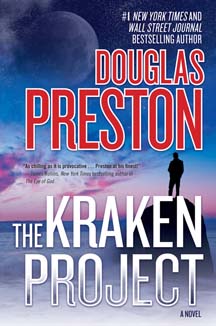It’s 2014, which means we’ve long since passed the theoretical Judgment Day when Skynet gains intelligence (1997, in “The Terminator”) and the year when supercomputer HAL 9000 turns on Dave Bowman in interplanetary space (2001, in “2001: A Space Odyssey”). Heck, it’s been a full 10 years since Lincoln Child wrote about a computer-controlled building run amok in his novel “Death Match” (which itself was a riff on the 1993 “X-Files” episode “Ghost in the Machine”).
Nonetheless, Douglas Preston – Child’s writing partner on the Pendergast and Gideon Crew novels – finds a new wrinkle in the ongoing fictional exploration of artificial intelligence. In “The Kraken Project” (May, hardcover), Preston asks “What if the first independently functioning artificial intelligence were good, rather than evil?”
One might expect a boring novel from that premise, but have no worries: “The Kraken Project” is Preston’s usual crackerjack thriller, peppered with big sci-fi and philosophical ideas. NASA computer-code programmer Melissa Shepherd creates Dorothy – the AI that will control a submarine in the Kraken Sea on Saturn’s moon of Titan — using “scruffy logic,” which allows an AI to learn and adapt, rather than act on strict rules, and therefore act more human. The concept seems fascinatingly plausible, as does Dorothy’s initial threat to pull a Skynet and wipe out humanity – although that latter point is rather clichéd.
“The Kraken Project” stands on its own legs when we get into Dorothy’s headspace. It – or “she,” as Melissa and former CIA agent Wyman Ford (from four previous Preston novels, most recently 2010’s “Impact”) gradually call her – lives in the Internet and quickly becomes disgusted with humanity. But then Dorothy digs deeper and decides humanity isn’t so bad: “Yes, human beings were insane and cruel and selfish and responsible for such horrific destructiveness … (but) the point was that they were able to create any good at all,” Dorothy realizes.
Similar to the robot boy Ethan on the summer TV series “Extant,” Dorothy doesn’t begin as an adult brain, she begins as a child. But whereas Ethan is designed to learn at a human rate, Dorothy learns at high-tech computer speed. Preston tantalizingly suggests that Dorothy will come up with the answer to the ultimate meaning of life if she keeps going at this rate. Preston engagingly toys with the concept much like he did in “Blasphemy,” where it seems God is communicating via a computer chat program. The ultimate punchline of “The Kraken Project” is Pollyanna-ish, but it still made me smile.
“The Kraken Project” also works as a thriller with good guys worth rooting for – notably 14-year-old Jacob, who plays with Dorothy when she downloads herself into his toy robot – and creepy bad guys, notably the assassin Kyrgyz brothers. I wouldn’t mind seeing Jacob or Melissa in future stories, and I suspect they will pop up again given Preston’s penchant for revisiting characters.

I think “The Kraken Project” would make a particularly good movie, especially with its twist on the old “boy and his robot” concept. Hopefully Hollywood – which adapted Preston and Child’s first novel, “Relic” – will someday rediscover the treasure trove of adaptable novels in Preston’s oeuvre (I see that 2008’s “The Monster of Florence,” at least, is being filmed). If not, I’m happy to keep reading new ones.

